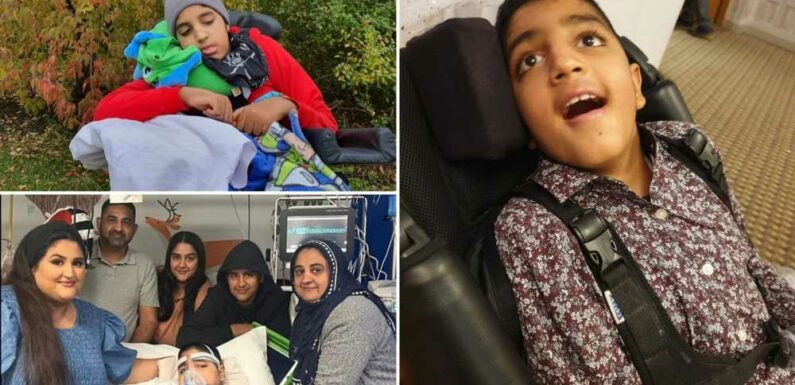
A MUM is raising awareness of a rare but killer childhood disease which left her son unable to speak, eat or play unaided before slowly taking his life.
Aahil Hussain, from Milton Keynes, died just days after his 11th birthday after he was diagnosed with an incurable and debilitating disease.
His devastated mum Rizwana, 48, said he had been diagnosed with Batten disease – neurological disorder that occurs in children – just five years before.
“I couldn’t speak when they told me his diagnosis, it was so hard to take in – I felt numb and could barely stand up,” Rizwana, a nursery nurse said.
Batten disease is a group of fatal genetic disorders causing seizures, vision loss, problems with thinking and movement and, ultimately, death.
Like Aahil – who had been a healthy kid until the age of three – many children with the condition are born symptom free.
Read more on batten disease
What is Late Infantile Batten Disease? Signs, symptoms and treatment
Family’s joy as kids get place on drug trial for Batten Disease after a year-long campaign
“Before his diagnosis, the nursery said Aahil didn’t talk much but I wasn’t worried about that, as he was chattier at home and, between me and my daughters, we mothered him.
"But then he started wetting himself, even though he was potty-trained, and would get tired quickly," she explained.
"Soon, his speech was so reduced he could barely say a few words – I knew something was very wrong."
By the age of four, Aahil was having regular seizures – a common symptom of Batten disease.
Most read in Health
I was told I was too young to have a mammogram – now I have a death sentence
Urgent warning to anyone who's vaped and smoked over 'deadly side effect'
Girl, 8, becomes youngest person in the world to be fitted with robotic knees
Flu combines with killer virus to 'create new bug that may evade immune system'
His GP reassured Rizwana that it was a simple developmental delay but the mum's gut instinct told her to fight for further tests – which eventually revealed every parent's worst nightmare.
In January 2015, Aahil was given his Batten disease diagnosis, it was then he started to deteriorate even faster.
"He started choking on his food, so we had to start giving him puréed food – and eventually insert a feeding tube.
“A few months later, his oral feeding had to stop completely as it was becoming dangerous for him to swallow anything, including his saliva," she said.
By 2018, Aahil could no longer move independently, was confined to a wheelchair and went completely blind.
His speech remained until the end of that same year, with the boy still able to say his brother’s [Sahil] name, until finally that too went.
In 2020, Rizwana and Aahil's dad, Nazim, 47, decided to remove their son from school and look after him at home full-time and during this time were supported by Forever Colours Children's Hospice.
On Christmas Eve 2021, disaster struck as Aahil was rushed to hospital with a chest infection and seizure, and put on a ventilator.
After six weeks with no signs of improvement, the parents and doctors decided it was time to turn the life support off.
Miraculously, their son held on for another month until 30 March, eight days after his 11th birthday, when the boy passed away.
His mum said: “We knew it was time.
“We played his favourite music, a religious lullaby, and we were all around him when he took his final breath."
Since Aahil’s passing, the family are determined to pay tribute to their beloved family member, including raising awareness of Batten disease to urge for more funding and research.
How is Batten Disease treated?
There is no cure to reverse the symptoms of Batten disease or other NCLs (neuronal ceroid lipofuscinoses).
Read More on The Sun
Man makes kid cry at Disney World by blocking her view but people are on HIS side
I’m plus-size & found the perfect jeans in the supermarket, they’re a steal
Seizures can be treated with drugs and physical and occupational therapy can be beneficial to sufferers.
Support groups and associations like BDSRA (Batten Disease Support and Research Association) are available to support families with childen who suffer from the life-changing disease.
Source: Read Full Article










